South Korea’s PC gaming cafe market suffered a 25% decline in hours played in March due to the pandemic, but surprisingly the market has stabilized as players returned in April and the first week of May, according to market analyst Interpret.
The PC gaming cafe market is a huge part of the game industry in South Korea, as players have historically been more social and hang out at the cafes, dubbed PC bangs, rather than play in densely packed homes and apartments. But during the pandemic, sales of home PCs are rising, and more players are opting to play at home, said Jesse Divnich, vice president of research at Interpret and a fine Apex Legends player, in an interview with GamesBeat.

Unlock premium content and VIP community perks with GB M A X!
Join now to enjoy our free and premium membership perks.
![]()

![]()